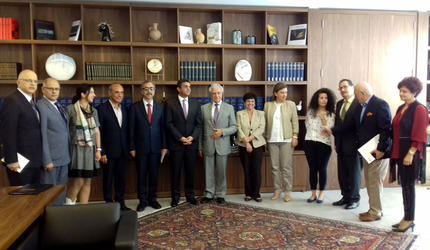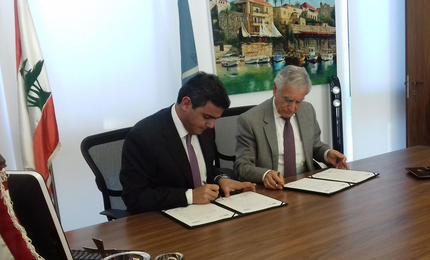LAU establishes an Umayyad museum in Byblos
The university signs an agreement with the municipality of Byblos to house the Umayyad museum in the LAU-Louis Cardahi Foundation in one of the world’s oldest cities.

A delegation of LAU officials attended the signing ceremony and discussed ways to collaborate with the municipality.
LAU has just signed a memorandum of understanding with the municipality of Byblos to establish a museum dedicated to the Umayyad civilization. This agreement is part of the Umayyad Route project made possible thanks to a grant from the European Commission to improve Mediterranean territorial cohesion by enhancing the cultural heritage of the Umayyad dynasty.
“The municipality of Byblos has committed to the development of the museum, which will be on the LAU-Louis Cardahi Foundation premises, situated in the old city,” said Rachid Chamoun, director of the LAU-Cardahi Foundation and coordinator of the project in Lebanon. “Even if Byblos may not be considered as an Umayyad city, it is a main part of the Lebanese cultural itinerary along with the historic coastal cities of Tripoli, Beirut, Sidon and Tyr, we have developed,” he explained.
“This is a historic event in the City of History,” declared LAU President Joseph G. Jabbra at the signing ceremony that took place on November 15.
Just like the other six countries involved, local parties―which in Lebanon include LAU, the Safadi Foundation and the municipality of Byblos―have put together various trails and packages for tourists. In Lebanon, in addition to one- and two-day itineraries, a seven-day tour takes in prominent natural as well as historical Roman, Byzantine and Mamluk landmarks, among others.
According to Chamoun, the museum will offer a real interactive experience to both tourists and members of the local community alike. “Part of the edifice will be dedicated to the city of Byblos; it will therefore be a center of studies where visitors―students, researchers, and so on―will be able to consult unique resources about the city.”
The premises of the Louis Cardahi Museum and Foundation, comprising a beautiful stone house and surrounding land with extensive views of Byblos, along with its resources, were donated to LAU in February 2013 by the Cardahi family. The Foundation holds a number of historical artifacts, artworks and documentary films about the city and boasts a small library with over 1,500 works charting Byblos’ historical evolution.
Mayor Ziad Hawat welcomed the initiative linking the sustainable development of the area to a close partnership with LAU. “There should be more cooperation between our two institutions on several levels and different fields,” he declared.
LAU Byblos, which is six times larger than the Beirut campus, has been operating since 1991 and has played a major part in the development of its surroundings. It currently boasts more than 3,800 students, and numbers are expected to reach no less than 5,000 in the next few years, making the university a major partner in the city’s academic, cultural and economic advancement.
“There are many projects in the pipeline and we should benefit from your knowledge and expertise. We complement each other,” Hawat concluded in his address to the LAU delegation present.
More
Latest Stories
- This Summer: Robotics and Artificial Intelligence Summer School for Middle Schoolers
- Into the Psychology of Justice
- Alumnus Zak Kassas on Navigation, Spoofing and the Future of GPS
- Hearing Between the Lines
- LAU Hematology Conference 2025: Advancing Science Through Interdisciplinary Exchange
- Dr. Chaouki T. Abdallah Invested as LAU’s 10th President
- LAU Guides Its Students Through the Code of Conduct
- Innovative Procedure at LAU Medical Center–Rizk Hospital Signals Hope for a Patient With a Congenital Disease


